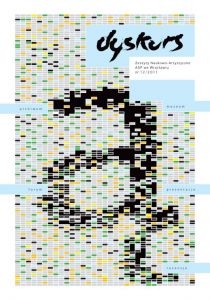Obraz-tekst. Struktury obrazowe oparte na tekście w konceptualnych i postkonceptualnych pracach Josepha Kosutha i Jana Świdzińskiego
Abstrakt
Image-text. The Structures of Images Based on Conceptual and Post-conceptual Art-pieces by Joseph Kosuth and Jan Świdziński
Kosuth uses printed texts in his textual art-pieces. He believes that his art-pieces become objective and stable by the way of his using of ready made forms. The square form of ‘Definition’ plays the same role. According to dictionaries, fonts copy letter forms. In his out-door installations, Kosuth uses script fonts, that are both similar to industrial and hand-written characters. His neon signs and signs lighted from underneath look like technical forms. The changes in text-images mirror different theoretical approach between Art after Philosophy and Artists as Anthropologists, i.e. between scientific objectivism and dynamic social life.
Texts by Świdziński are almost without exception hand-written texts. The artist himself writes the texts. They can be considered in the context of ‘performances’. Sometimes, writing becomes a performance videoperformance, which includes the images of direct presence of the artist on the same basis documents and artifacts are proofs of actions. Hand-written texts do not attack on-lookers, they do not look official, they are not order-like, they do not persuade, and they do not form distance, hierarchies that contribute to ‘discriminate between those who know and those who should be taught’*. This is the reason Kosuth uses fonts that resemble hand-written letters. Kosuth and Świdziński meet with each other on external and internal platform based on a pattern designed according to the metaphor of tourist. Together with other formal features, image-texts reveal the presence factor: existing in the reality as existing in art.
* Jan Świdziński, Art, people and self-consciousness, Warsaw 2009, p. 138.

